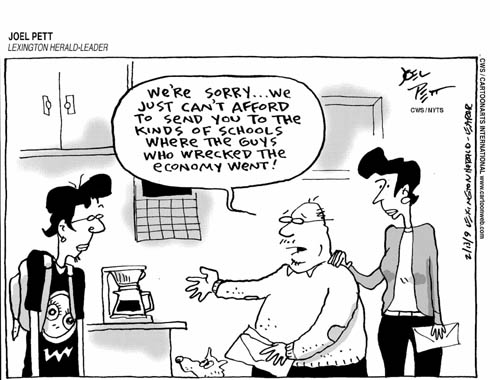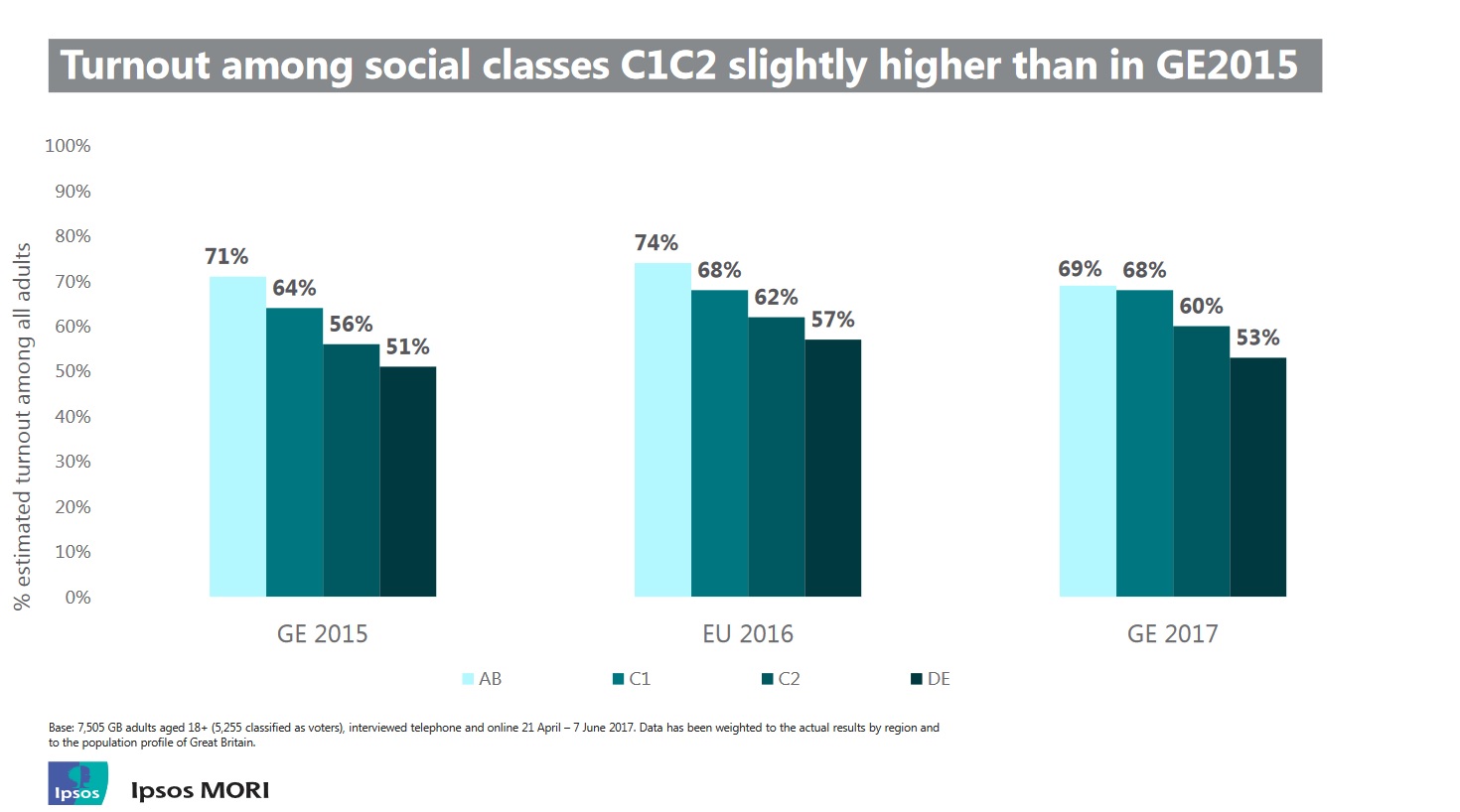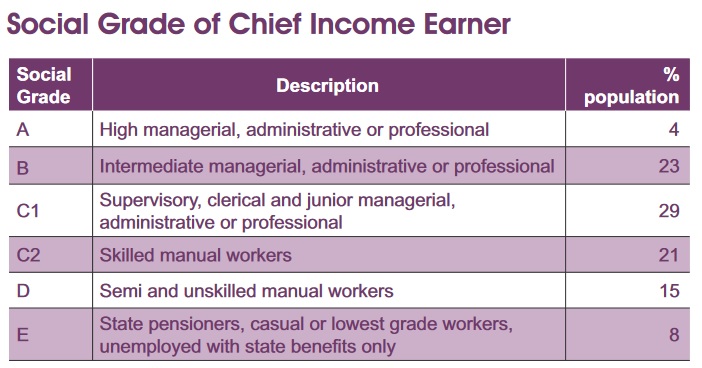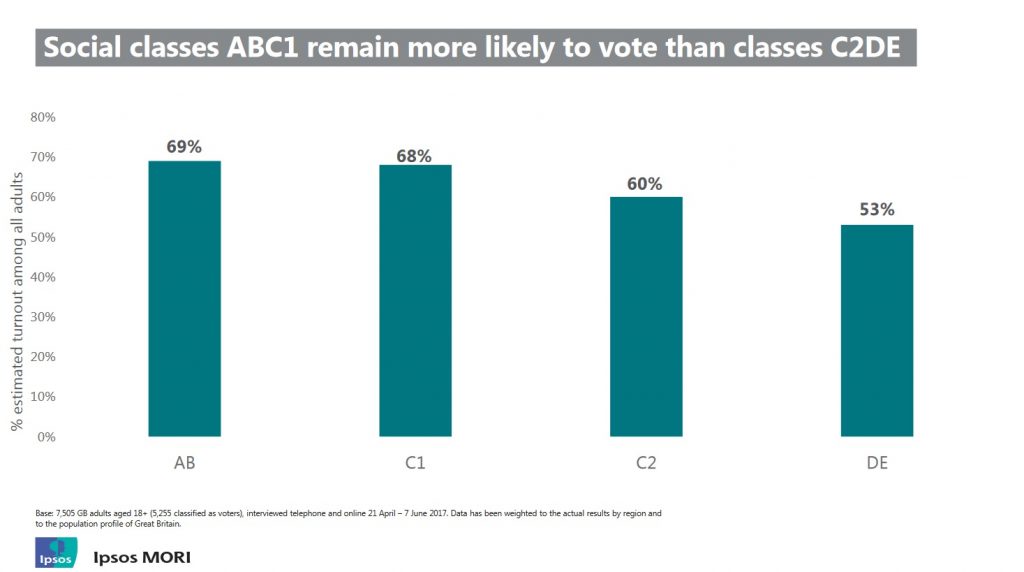What do we mean by social class?
A division of a society based on social and economic status. (Oxford Dictionaries, 2018)
Fig.1 Ipsos Mori (2009). This table groups people into different social grades.
Social class needs to be brought up when discussing different factors affecting political engagement and voting behaviour among the society. Although some argue that social class is no longer important in the 21st century, it is clear that there are differences between those from various socio-economic groups, especially in access to education, mental and health care and career prospects. I could go on and on about it, as others before me have done it, but today I will focus solely on how social class, and therefore education, affects our levels of political awareness and participation.
Your socioeconomic background has a huge impact on what career you will end up doing:
The economic background of your parents more often than not decides on the level and quality of education you will achieve in your life. The term ‘post-code lottery’ has quite a literal meaning. If you are lucky (rich?) enough to live in a nice inner-city area that funds their state schools well, and you yourself are able to go to a school that is not overcrowded and has a good OFSTED rating then you can consider yourself a winner. But what of those who live in poorer, often rural, areas of the country and area unable to move? The quality of the education these children receive differs from others who live in more affluent areas. When you compare the differences between state-funded and privately-funded schools, the inequality is even clearer.

Although ideally pupils at every kind of school should receive equal education in politics through the subject of citizenship that was made part of the national curriculum in 2002, after a discussion with my class mates I realised that is not what happens. Personally, I attended a state school and remember learning something about what rights do I have as a citizen and that we should all write to our MP’s to impact their actions. But neither me, nor other people who I discussed this topic with, could remember anything about learning about the voting system, about what each party stands for, or why is it important to vote. Arguably, children who are encouraged to take part in school elections and debating societies and are taught the value of politics are more likely to show later interest in current affairs. Is that what happens at Eton and similar schools, or is it simply because they are part of a closed inner circle?

Fig.2 Sutton Trust (2016) – Leading People.
A report by Sutton Trust (2016) has uncovered that out of UK’s school student population, only 7% attended a private school and out of university graduates, less than 2% attended either Oxford or Cambridge universities. However, this small proportion of UK’s population makes up the majority of UK’s judges, barristers and lawyers, military officials and doctors, as well as a significant number of UK’s politicians. Majority of Prime Ministers including Theresa May, David Cameron, Tony Blair, Margaret Thatcher and others, all attended the Oxford University. Clearly, the school you attend means a lot if one chooses to engage politically.
Come Election Day, each member of the society should have an equal chance to cast their vote. However, the following tables from Ipsos Mori (2017) show that those identified as C2 and D and E social grade are less likely to vote. Why? Is it because they lack knowledge and/or interest in politics through inadequate education or family socialisation? Arguably, home is the first place where we hear about politics. Children are more likely to show interest in politics if their parents or guardians discuss the topic with them, as well as the importance of voting and how it affects them.
Fig.3 Ipsos Mori (2017) Fig.4 Ipsos Mori (2017)
Fig.4 Ipsos Mori (2017)
I can think of few more reasons why those from poorer socio-economic backgrounds are less likely to vote.
They might believe that their vote does not make a difference, as the ruling class in the government is formed from the same type of individuals year after year. Affluent, white, highly and most often privately educated.
Or perhaps they simply cannot? It is more difficult for those from the lower social grades to find time, or money, or resources to be able to vote. They are more likely to have more than one job, making it harder to find time to show up to their local electoral centre. They might be unable to travel, unable to afford a bus fare or to pay a babysitter while they go out to vote. In the daily lives of those struggling most, voting may not seem as important as to those from higher social grades. This needs to change, as the social divides and inequalities will continue to grow unless the glass ceiling in education and the social class discrimination in professions continues to happen.
Ipsos Mori. (2009). Social Grade – A Classification Tol. Available: https://www.ipsos.com/sites/default/files/publication/6800-03/MediaCT_thoughtpiece_Social_Grade_July09_V3_WEB.pdf. Last accessed March 2018.
Ipsos Mori. (2017). How Britain voted in the 2017 election. Available: https://www.ipsos.com/sites/default/files/2017-06/how-britain-voted-in-the-2017-election_2.pdf. Last accessed March 2018.
Oxford Dictionaries. (2018). Social Class. Available: https://en.oxforddictionaries.com/definition/social_class. Last accessed March 2018.
Sutton Trust. (2016). Leading People. Available: https://www.suttontrust.com/wp-content/uploads/2016/02/Leading-People_Feb16.pdf. Last accessed March 2018

